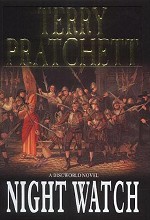
Night Watch
Terry Pratchett
364 pages
published in 2002
I had some difficulties in procuring this book. As you may or may not be aware of, sunday last week saw the worst storm the Netherlands had had in ten years, with windbursts just this side of hurricanes and lots and lots of rain. Though it had been raining steadily during the day we innocently thought it would be alright to just nip down to the Waterstones in the centre of Amsterdam to buy our copies of Night Watch which a kindly person had sms-ed us about. Unfortunately, we were wrong... Having to walk three kilometres through the driving rain and wind is not my idea of fun, though it certainly was bracing.
So, was it worth it? Yep.
Night Watch is a vast improvement on its immediate predecessor Thief of Time which was okay but ultimately disappointing. I would go as far as to say it's the best regular series Discworld novel since Hogfather. When you look at the series as a whole, you find that you can divided it into two categories. There are the Serious books with a Message (Small Gods and Jingo frex) and there are the Romps (most Rincewind adventures). Night Watch manages to be both.
As you may know if you've followed the Discworld series, at heart Pratchett is somewhat of a moralist and not afraid to let this show in his books, not always succesfully (Jingo). His is a humanistic philosophy, a deep mistrust of authority and the will of the people both, coupled with a belief in the fundamental decentness of individual people. Sometimes this leads him to preach, but here he manages to let his philosophy come across withou doing so, helped by the considerable humour in this novel.
The plot revolves around Sam Vimes, sent back in time accidently to a time when his younger self was just starting out in the night watch and now he has to train himself. This at a time when revolution is threatening. He knows what is going to happen and now he has the chance to change things for the better, but what will this do to his present^wfuture life?
Pratchett's view of revolution feels incredibly real and realistic to me, just as his earlier view of "industrial revolution" Ankh-Morpork in The Truth did. In general, the whole Discworld has long since evolved from fantasyland to something as real in its own way as France, but here it is particularly noticable. Possibly this is because he gives Ankh-Morpork a past here, fleshing it out and showing that the city wasn't always the relatively nice place it is today.
In all, the best Discworld book in years. On a sadder note, this is the first main series Discworld novel without a Josh Kirby cover, who sadly passed away some time ago...
